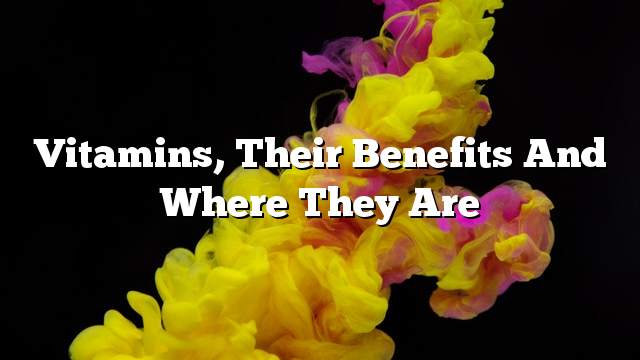Vitamins
There are many vitamins that play an important role in the implementation of the functions of the body is vital, including what is dissolved in water, including what is soluble in fat, and the sources vary from plant and animal, and the needs of the body in small quantities, but very important, and we will show the importance of some vitamins and Where to get it.
Vitamin A
- Benefits: It is important for the growth of bones and teeth, maintaining good looking, and skin resistance to infections, reproduction, and lactation.
- confiscation:
- Plant sources: carrots, parsley, melons, apricots, spinach, walnuts, beans, apricots, cauliflower, peaches, lettuce, tomatoes, bananas.
- Animal sources: egg yolk, milk and its products, fatty fish, fish oil.
- Effects of deficiency on the body:
- Dry eye, night blindness, and corneal cornea.
- Delayed growth in children.
- Delayed wound healing.
- White spots appear on nails.
- Double teeth.
- diarrhea.
- Infertility in men, and vaginal dryness in women.
- Hearing impairment.
- Sore throat, trachea, and throat.
Vitamin B1
- Benefits: Is important for the nervous system, and is more important after the exertion of muscle.
- confiscation:
- Plant sources: wheat crust, wheat germ, beans, cabbage, potatoes, carrots, figs, nuts such as hazelnuts, walnuts, almonds, oranges and cauliflower.
- Animal sources: egg yolks, fish, meat, liver, yogurt.
- Effects of deficiency on the body:
- Neurological disorders such as headaches, numbness in the limbs, insomnia, nervousness and disorder.
- Gastrointestinal disorders such as nausea, vomiting, constipation, and loss of appetite for food.
- Muscle disorders such as paralysis, muscle atrophy.
- Disorders in blood circulation as heart palpitations and weakness.
Vitamin B2
- Benefits: Contributes to cell growth and helps absorb iron.
- confiscation:
- Plant sources: bananas, peaches, apricots, spinach, tomatoes, radishes, corn, and oats.
- Animal sources: Milk and milk products, fish, eggs, liver, heart, kidneys.
- Effects of deficiency on the body:
- Inflammation of tongue and gums.
- Crack lips.
- Form a membrane on the cornea of the eye, frequent tears.
- Disorders in digestion.
- Congestion in the blood vessels.
- Break nails.
- Hair loss.
- Anemia.
Vitamin B3
- Benefits: It enters the formation of red blood cells, helps growth, which is important for the health of the skin and for the work of the nervous system, and the digestive system.
- confiscation:
- Plant sources: Yeast of bread, tomatoes, legumes such as beans, chick peas, peas, cauliflower, cabbage, and carrots.
- Animal sources: meat and egg yolks.
- Effects of deficiency on the body:
- Gastrointestinal problems such as nausea, vomiting, constipation, and inflammation of the intestines.
- Weak memory, confusion in thought, headaches, and vertigo.
- Heartburn in the skin and tongue.
- Buzz in the ear.
vitamin C
- Benefits: Helps to form red blood cells, increase immunity, growth, fight against inflammation, and cancer.
- confiscation:
- Plant sources: citrus, tomatoes, spinach, carrots, apples, grapes, watercress, cauliflower, parsley.
- Animal sources: liver, milk.
- Effects of deficiency on the body:
- Anemia.
- tooth decay.
- Arthritis.
- Colds and flu.
- The slow pace of bone fracture when broken.
- Ulcers.
Vitamin D
- Benefits: Helps to build bones and teeth, it works to calcify the lime.
- confiscation:
- Plant sources: None in plants, can be obtained through exposure to sunlight.
- Animal sources: fatty fish, milk and its products, and eggs.
- Effects of deficiency on the body:
- Ricks in children.
- Osteoporosis.
- Deformity in bone formation.
- Rheumatism.
- Eczema.
Vitamin E
- Benefits: It is important for the work of the pituitary gland, the production of sex hormones, the growth of embryos, the formation of sperm, and the strengthening of the heart muscle.
- confiscation:
- Plant sources: parsley, watercress, olive oil, corn oil.
- Animal sources: egg yolk, milk and its products, liver.
- Effects of deficiency on the body:
- Abortion.
- Non-sperm production.
- Weakness of the heart muscle.
- Early menopause.
- heart attack.
